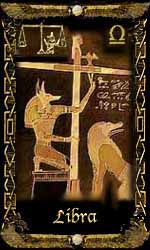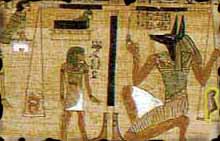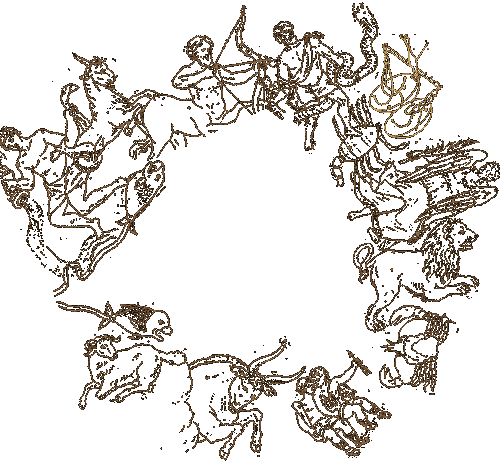




Libra the Scales, located between Virgo and Scorpio, can be traced back to the
Sumerians of around 2000 BC which called the constellation the 'Balance of Heaven',
maybe because that time the autumnal equinox could be found there, one of the two
days in the year where night and day were of equal length.
![]() The ancient Egyptians also saw a pair of scales in Libra and
associated it to the scales of Anubis, the jackal-headed god of the dead. Anubis was
the one leading the souls of the dead to the underworld, but he judged the souls by
what they had done in life. He would place the heart of the deceased on one scale
and weight it against the Feather of Truth which was provided by Maat, the goddess
of truth. If the deceased has been good his heart would be light and equal to the
feather, and Anubis would send the soul to the kingdom of Osiris. If the heart was
loaded by sins it would weight more than the feather, and the soul was lost forever.
The ancient Egyptians also saw a pair of scales in Libra and
associated it to the scales of Anubis, the jackal-headed god of the dead. Anubis was
the one leading the souls of the dead to the underworld, but he judged the souls by
what they had done in life. He would place the heart of the deceased on one scale
and weight it against the Feather of Truth which was provided by Maat, the goddess
of truth. If the deceased has been good his heart would be light and equal to the
feather, and Anubis would send the soul to the kingdom of Osiris. If the heart was
loaded by sins it would weight more than the feather, and the soul was lost forever.

![]() Anubis was an objective god, honorful but merciless, a
symbol of justice and final judgement of which no-one could escape. The scales were
his attribute, and in the sky two stars of Libra, known today as Sigma Librae and
Zubenelgenubi, were the gate where all the planets including sun and moon had to
pass through on their way across the ecliptic.
Anubis was an objective god, honorful but merciless, a
symbol of justice and final judgement of which no-one could escape. The scales were
his attribute, and in the sky two stars of Libra, known today as Sigma Librae and
Zubenelgenubi, were the gate where all the planets including sun and moon had to
pass through on their way across the ecliptic.
The Greeks did not see any scales in Libra but regarded it as a part of Scorpio
which they called 'Chelae', the 'claws', which is the reason why Libra is the only
sign in the zodiac not associated to a person or animal of Greek mythology. Arab
astronomers followed the Greek and gave two of Libra's stars their names:
Zubenelgenubi which means 'southern claw' and Zubeneschamali which translates as
'northern claw'.
The Romans saw Libra as an independent constellation again from about 100 BC,
associating it once more to scales as a symbol of justice. For them, the scales
where held by Justitia (Astraea or Dike), the goddess of justice. Like anubis, she
judged the souls of the deceased by weighing them in their balance.



